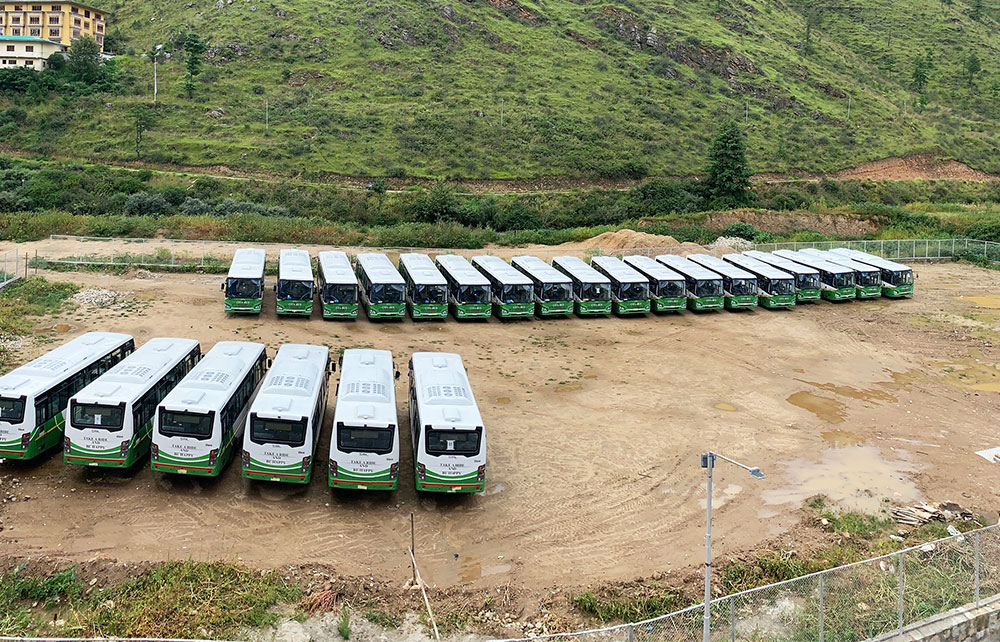Yangyel Lhaden
Thimphu Thromde’s City Bus Services started testing the Global Positioning System (GPS) and audio notifications in its new buses last week.
The thromde added 27 new buses to its fleet on August 29. The buses are expected to enhance and improve the public transport service in the thromde. City Bus Services now has 68 buses.
To improve and revamp the current modality of City Bus Services, Thimphu Thromde’s geographic information system (GIS) team mapped the new routes, bus stops, and terminals identified through GIS-based street mapping.
The City Bus Services management is going to introduce a smart card system and an application called Gakyid Ride.
City Bus Service’s manager, Sangay Dorji, said that the new buses would be inaugurated in November. “During the trial in the next two months, we want to ensure the new buses work perfectly.”
He said the new buses were friendly for persons with disabilities as they have wheelchair ramps and an audio message system in Dzongkha, which would help persons with blindness know which stop they reached.
“A person coming to Thimphu for the first time will also know about bus stops through the audio notification,” he said.
Sangay Dorji said in the first phase of implementation of the study, a trunk route from Babesa to Pangrizampa in North Thimphu would be implemented where every 10 minutes a bus would reach a bus stop. A few subsidiary routes would also be implemented.
Some 10 subsidiary routes have been identified in places that are not connected by trunk routes. Sangay Dorji said the new subsidiary routes introduced in the first phase included Kuensel Phodrang, Royal Thimphu College (RTC) and Yangchenphug Higher Secondary School.
He said according to GIS team’s study, about 100 buses would be required. “We cannot execute the whole plan at one go and it will be implemented in phases.”
Sangay Dorji said old city buses would be surrendered gradually and new city buses with smart card systems would be procured and GPS would be installed in buses.
The GIS team has also identified a bus terminal each at Dangrina in North Thimphu and RTC area in South Thimphu and City Bus Services office in the centre. Sangay Dorji said that gradually time would be saved as buses would not have to follow circular routes as they do today.
The City Bus Services plans to provide smart cards of four categories which would be introduced at concessional prices for persons with disabilities, students and senior citizens.
City bus fare ranges from Nu 10 and Nu 50. Persons with disabilities, students and senior citizens will get a discount of 20 percent, 30 percent and 10 percent, respectively.
Sangay Dorji said they were trying to keep the price of the smart cards below Nu 75. He said that the smart card was introduced to avoid revenue leakage and promote digital transactions.
For one-time users, temporary cards that would cost double the amount would be provided to encourage people to buy smart cards.
City Bus Services is also planning to buy Gakyid Ride application with support from UNDP.
He said the mobile application was developed by two young developers to track the buses through GPS. For example, he said, we have to only enter the bus stop and the application will show from where the bus is coming from and at what time.
“Our city bus services will become more reliable with the mobile application.”
With the purchase of the 27 buses, 30 drivers’ vacancies have been announced. Only 19 candidates were shortlisted as it was difficult to get bus drivers as per the requirement of the Road Safety and Transport Authority (RSTA) regulations, which requires a three-year experience in heavy vehicles.
He said the management proposed doing away with the three-year experience requirement and allowing candidates to be trained in training institutes in heavy vehicles. “RSTA accepted our request.”
Sangay Dorji said an individual has to be a class 10 graduate to be a city bus driver. He said in collaboration with the labour ministry, 15 individuals in the first batch are expected to go for a six-month training course. “An introductory refreshers course on Bhutanese codes of conduct and etiquette (driglam namzha), communication skills, and how to assist persons with disabilities will be taught to drivers.”
Edited by Tshering Palden


